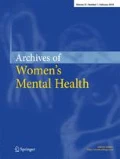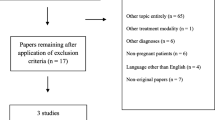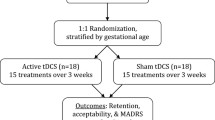Abstract
The aim of the present study was to assess the safety and effectiveness of high-frequency repetitive transcranial magnetic stimulation (rTMS) in pregnant patients with depression. Thirty depressed pregnant patients received rTMS over the left prefrontal cortex for 6 days in a week, from Monday to Saturday for 3 weeks. The rTMS intensity was set at 100 % of the motor threshold. A 25-Hz stimulation with a duration of 2 s was delivered 20 times with 30-s intervals. A session comprised 1,000 magnetic pulses. Depression was rated using the 17-item Hamilton depression rating scale (HAMD) before and after treatment. Response was defined as a 50 % reduction of the HAMD score. Patients with HAMD scores less than 8 were considered to be in remission. The mean HAMD score for the study group decreased from 26.77 ± 5.58 to 13.03 ± 6.93 (p < 0.001) after 18 sessions of rTMS. After the treatment period, 41.4 % of the study group demonstrated significant mood improvements as indexed by a reduction of more than 50 % on the HAMD score. In addition, 20.7 % attained remission (HAMD score < 8), 34.5 % achieved a partial response, and 3.4 % had worsening in HAMD scores at the end of treatment. Treatment was well tolerated, and no significant adverse effects were reported. rTMS was well tolerated and found to be statistically and clinically effective in pregnant patients with treatment-resistant depression. This study contributed to the existing evidence of the antidepressant effect of rTMS in the treatment of depression in pregnancy.
Similar content being viewed by others
References
Akdemir A, Orsel S, Dag I, Iscan N, Ozbay H (1996) Hamilton depresyon derecelendirme ölçeğinin geçerliliği, güvenilirliği ve klinikte kullanımı. Psikiyatri Psikoloji Psikofarmakoloji Dergisi 4:251–259 (Turkish)
Andrade SE, McPhillips H, Loren D, Raebel MA, Lane K, Livingston J, Boudreau DM, Smith DH, Davis RL, Willy ME, Platt R (2009) Antidepressant medication use and risk of persistent pulmonary hypertension of the newborn. Pharmacoepidemiol Drug Saf 18(3):246–252
Avery DH, Holtzheimer PE 3rd, Fawaz W, Russo J, Neumaier J, Dunner DL, Haynor DR, Claypoole KH, Wajdik C, Roy-Byrne P (2006) A controlled study of repetitive transcranial magnetic stimulation in medication-resistant major depression. Biol Psychiatry 59:187–194
Avery DH, Isenberg KE, Sampson MS, Janicak PG, Lisanby SH, Maixner DF, Loo C, Thase ME, Demitrack MA, George MS (2008) Transcranial magnetic stimulation in the acute treatment of major depressive disorder: clinical response in an open-label extension trial. J Clin Psychiatry 69(3):441–451
Campagne DM (2007) Fact: antidepressants and anxiolytics are not safe during pregnancy. Eur J Obstet Gynecol Reprod Biol 135(2):145–148
Epperson CN, Terman M, Terman JS, Hanusa BH, Oren DA, Peindl KS, Wisner KL (2004) Randomized clinical trial of bright light therapy for antepartum depression: preliminary findings. J Clin Psychiatry 65(3):421–425
Gahr M, Blacha C, Connemann BJ, Freudenmann RW, Schönfeldt-Lecuona C (2012) Successful treatment of major depression with electroconvulsive therapy in a pregnant patient with previous non-response to prefrontal rTMS. Pharmacopsychiatry 45(2):79–80
Gentile S (2005) SSRIs in pregnancy and lactation: emphasis on neurodevelopmental outcome. CNS Drugs 19(7):623–633
George MS, Nahas Z, Kozel FA, Li X, Denslow S, Yamanaka K, Mishory A, Foust MJ, Bohning DE (2002) Mechanisms and state of the art of transcranial magnetic stimulation. J ECT 18:170–181
Hamilton M (1960) A rating scale for depression. J Neurol Neurosurg Psychiatry 23:56–62
Isenberg K, Downs D, Pierce K, Svarakic D, Garcia K, Jarvis M, North C, Kormos TC (2005) Low frequency rTMS stimulation of the right frontal cortex is as effective as high frequency rTMS stimulation of the left frontal cortex for antidepressant free, treatment resistant depressed patients. Ann Clin Psychiatry 17:153–159
Janicak PG, O'Reardon JP, Sampson SM, Husain MM, Lisanby SH, Rado JT, Heart KL, Demitrack MA (2008) Transcranial magnetic stimulation in the treatment of major depressive disorder: a comprehensive summary of safety experience from acute exposure, extended exposure, and during reintroduction treatment. J Clin Psychiatry 69:222–232
Kim DR, Epperson N, Paré E, Gonzalez JM, Parry S, Thase ME, Cristancho P, Sammel MD, O'Reardon JP (2011a) An open label pilot study of transcranial magnetic stimulation for pregnant women with major depressive disorder. J Women's Health (Larchmt) 20(2):255–261
Kim DR, Sockol L, Barber JP, Moseley M, Lamprou L, Rickels K, O'Reardon JP, Epperson CN (2011b) A survey of patient acceptability of repetitive transcranial magnetic stimulation (TMS) during pregnancy. J Affect Disord 129(1–3):385–390
Klirova M, Novak T, Kopecek M, Mohr P, Strunzova V (2008) Repetitive transcranial magnetic stimulation (rTMS) in major depressive episode during pregnancy. Neuroendocrinol Lett 29(1):69–70
Lisanby SH (2002) Update on magnetic seizure therapy: a novel form of convulsive therapy. J ECT 18:182–188
Lisanby SH, Kinnunen LH, Crupain MJ (2002) Applications of TMS to therapy in psychiatry. J Clin Neurophysiol 19:344–360
Nahas Z, Bohning DE, Molloy MA, Oustz JA, Risch SC, George MS (1999) Safety and feasibility of repetitive transcranial magnetic stimulation in the treatment of anxious depression in pregnancy: a case report. J Clin Psychiatry 60(1):50–52
O'Reardon J, Solvason H, Janicak P, Sampson S, Isenberg KE, Nahas Z, McDonald WM, Avery D, Fitzgerald PB, Loo C, Demitrack MA, George MS, Sackeim HA (2007) Efficacy and safety of transcranial magnetic stimulation therapy in the acute treatment of major depression: a multi-site randomized controlled trial. Biol Psychiatry 62:1208–1216
Oren DA, Wisner KL, Spinelli M, Epperson CN, Peindl KS, Terman JS, Terman M (2002) An open trial of morning light therapy for treatment of antepartum depression. Am J Psychiatry 159(4):666–669
Rossi S, Hallett M, Rossini PM, Pascual-Leone A, Safety of TMS Consensus Group (2009) Safety, ethical consideration and application guidelines for the use of TMS in clinical practice and research. Clin Neurophysiol 120(12):2008–2039
Shajahan PM, Glabus MF, Steele JD, Doris AB, Anderson K, Jenkins JA, Gooding PA, Ebmeier KP (2002) Left dorso-lateral repetitive transcranial magnetic stimulation affects cortical excitability and functional connectivity, but does not impair cognition in major depression. Prog Neuropsychopharmacol Biol Psychiatry 26(5):945–954
Tan O, Tarhan N, Coban A, Baripoglu SK, Guducu F, Izgi HB, Hizli G, Ates O, Bulut H (2008) Antidepressant effect of 58 sessions of rTMS in a pregnant woman with recurrent major depressive disorder: a case report. Prim Care Companion J Clin Psychiatry 10(1):69–71
Tarhan N, Hızlı Sayar G, Tan O, Kagan G (2012) Efficacy of high-frequency repetitive transcranial magnetic stimulation in treatment-resistant depression. Clin EEG Neurosci 43(4):279–284
Zhang D, Hu Z (2009) rTMS may be a good choice for pregnant women with depression. Arch Women's Ment Health 12(3):189–190
Author information
Authors and Affiliations
Corresponding author
Rights and permissions
About this article
Cite this article
Hızlı Sayar, G., Ozten, E., Tufan, E. et al. Transcranial magnetic stimulation during pregnancy. Arch Womens Ment Health 17, 311–315 (2014). https://doi.org/10.1007/s00737-013-0397-0
Received:
Accepted:
Published:
Issue Date:
DOI: https://doi.org/10.1007/s00737-013-0397-0




